August 10, 2025
Best Milanote alternatives for creative professionals

You've been using Milanote for your projects, but something's missing. Maybe you're tired of constantly switching between your browser and the app. Or you wish it had better AI features to help with research.
Whatever brought you here, you're in the right place.
TL;DR: Quick Picks for Busy People
Best overall Milanote alternative: Kosmik - AI-powered research tool with built-in browser
Best for enterprises: Miro - Industry standard with extensive templates
Best all-in-one workspace: Notion - Highly flexible database-driven platform
Best for simple task management: Trello - Clean Kanban boards, easy to learn
Best for speed: Nuclino - Lightning-fast knowledge base
Best feature-packed option: ClickUp - Comprehensive project management
Best for researchers: Scrintal - Academic-focused visual note-taking
Best for traditional notes: Evernote - Classic note-taking with powerful search
Get started with Kosmik to experience AI-powered research and multimedia workflows.
Now let's dive deep into the 8 best alternatives that actually deserve your attention in 2026.
Why People Are Looking For Milanote Alternatives?
Before we jump into alternatives, let's be honest about why you're probably here. Milanote is decent, but it's got some real limitations:
Research is a pain. You're constantly jumping between your browser and Milanote. Found something cool online? Screenshot, save, switch apps, upload. It's 2026. This shouldn't be so clunky. Studies show that frequent app switching can reduce productivity by up to 25%.
No AI assistance. While other tools are using AI to suggest content and automate tagging, Milanote feels stuck in 2019. Modern creative work needs intelligent assistance.
Limited multimedia support. Sure, you can add files, but try reading a PDF or watching a video natively. You'll be opening other apps constantly.
Integrations are weak. Good luck connecting Milanote to your existing workflow. Most integrations feel like afterthoughts.
Pricing adds up fast. Once your team grows, those monthly costs start to sting, especially when you're missing features other tools include.
No offline work. Internet cuts out? Your workflow stops. Not ideal if you travel or work in areas with unreliable internet.
What Actually Matters in a Creative Workspace
Here's what we found after reviewing dozens of tools:
AI-powered research capabilities are game-changers. Tools that can automatically suggest related content, tag your resources, and help discover visual inspiration save hours every week. Studies show that AI-assisted workflows can increase productivity by up to 40%.
Built-in web browsing eliminates the app-switching nightmare. The best tools let you research, capture, and organize without ever leaving your workspace.
Native multimedia support means reading PDFs, watching videos, and annotating images right in your workspace. No more juggling multiple apps.
Visual similarity search uses AI to find related images and inspiration automatically. It's like having a creative assistant that never sleeps.
Real performance optimization across platforms. Nobody has time for laggy interfaces when creativity strikes.
The bottom line? Modern creative tools should enhance your natural workflow, not fight against it.
8 Best Milanote Alternatives (Ranked)
1. Kosmik - Best Milanote alternative

Kosmik is like Milanote, but with a built-in browser and AI that actually helps with research. Instead of just organizing your ideas, it actively helps you discover new ones.
The built-in browser is brilliant. You can research, capture inspiration, and organize everything without switching apps. But here's where it gets interesting: the AI watches what you're working on and suggests related content automatically.
Working on a design project? Kosmik finds similar images across the web. Writing content? It pulls relevant links and resources. It's like having a research assistant that actually understands your work.
Pros:
Built-in browser eliminates app switching: Research and organize in one place. Click any element on a web page and it's instantly saved to your canvas with source link preserved.
Web Clipper extension for quick capture: The Web Clipper extension lets you capture content from any Chrome tab directly to your workspace. No more screenshot-save-switch-upload workflow.
AI visual similarity search: Finds related images, videos, and content automatically based on what you're working on. Like having a research assistant that understands visual context and surfaces inspiration you'd never discover manually.
Complete multimedia support with annotation: Native PDF reader, video player, and seamless image handling all in one workspace. Drawing tools let you annotate PDFs with pen and marker directly on canvas.
True all-in-one workspace: Read documents, watch videos, mark up research papers, and organize visuals without opening separate apps. Everything stays in your canvas.
Native cross-platform experience: Dedicated Mac and Windows apps that feel fast and responsive, not just wrapped web apps. Optimized for each platform's UI patterns.
Risk-free trial: Full 1-week trial with all Pro features unlocked. Test the built-in browser and AI tools before committing to $11.99/month (yearly billing).
Cons:
Smaller community: As a newer tool, there are fewer tutorials, templates, and third-party resources compared to established alternatives like Notion or Miro. Community forums are active but smaller.
Growing template library: Built-in templates cover common use cases (moodboards, research, projects) but the selection isn't as extensive as Notion's or Miro's thousand-plus templates. New templates added regularly.
Integrations in development: Third-party integrations (Zapier, Slack, etc.) are still being built out. However, the built-in browser and native file support reduce the need for many integrations that other tools require.
Pricing:
1 week free trial (paid plans start at $11.99/month)
Perfect for:
Research-heavy work with lots of visual content and web sources, designers creating moodboards, anyone working with multimedia content (PDFs, videos, images), people tired of switching between browser and workspace apps
Why Kosmik is the Best Milanote Alternative?
If you're here reading this, you've probably experienced the common Milanote frustrations. The constant app switching, the manual organization, the workflow interruptions. Here's how Kosmik addresses each one:
One-click research capture: You know the routine with Milanote: find something online, screenshot it, save to desktop, switch apps, drag and drop, try to remember the source. With Kosmik's built-in browser, you click any web element and it's saved directly to your canvas with source link automatically included. No more screenshot-save-switch workflow.
AI discovers related content automatically: Building a mood board for a coffee shop rebrand? Kosmik automatically finds similar aesthetics, color palettes, and related YouTube videos while you work. It's like having a research assistant who understands your project and surfaces relevant inspiration without you asking.
Everything works in one place: Need to read a brand guidelines PDF while referencing competitor videos and organizing inspiration images? In Milanote, that requires switching between multiple apps. In Kosmik, PDFs open in the side panel, videos play inline, and images arrange on the same canvas.
Mark up PDFs directly on canvas: Annotation tools (pen, marker, eraser) let you highlight key sections, sketch ideas, and mark up research papers without leaving your workspace. All annotations stay with your content on the canvas.
AI tags everything automatically: Drop in 50 images from a research session and Kosmik automatically categorizes them by style, color, themes, and visual elements. No manual tagging work required.
Search without manual tagging: Search for "minimalist blue logos" and Kosmik finds them using AI semantic understanding, even though you never manually tagged anything. The AI understands your content contextually.
What real user says about Kosmik:
"It's an interesting app made by a dedicated indie team that cares about what they are doing, are extremely active in their community, and responsive when it comes to bugs & feature requests. The closest tool that I can compare it to is Freeform by Apple and Kosmik is a lot richer and fuller experience."
Get started with Kosmik and see how it helps you to improve your creative workflows.
2. Miro - The Enterprise Favorite
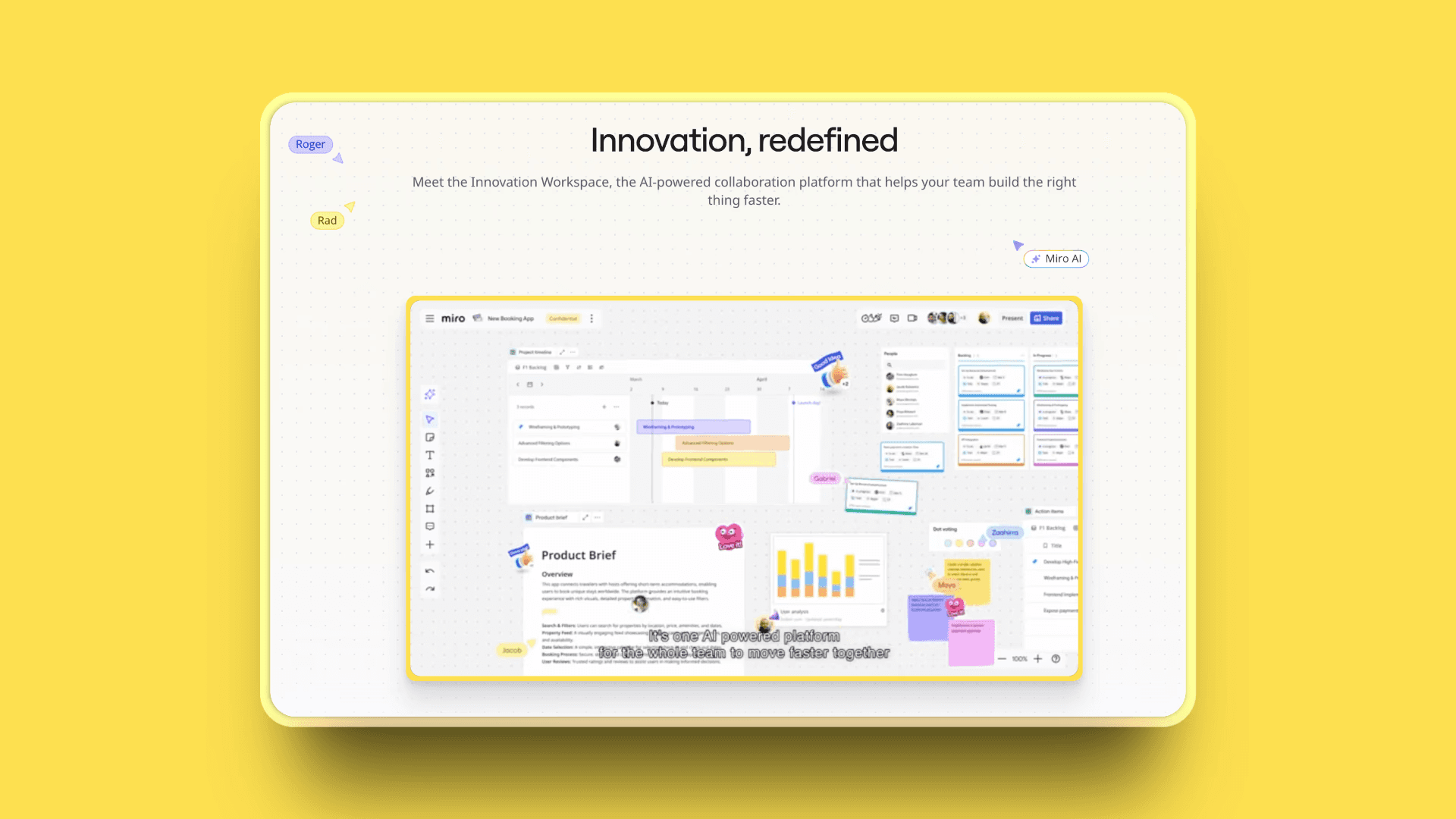
Miro is the visual collaboration whiteboard tool that every big company uses for workshops and team collaboration. Miro is the safe choice. It's what IBM and Netflix use for their creative sessions. Tons of templates, rock-solid collaboration features, and integrations with everything.
But here's the thing, it can feel like overkill for simple creative projects. It's built for 50-person workshops, not quick individual brainstorming.
Pros:
Massive template library for every situation: Over 2,000 pre-built templates covering design sprints, agile workflows, mind mapping, customer journey maps, and more. Every common workshop format already exists, saving hours of setup time.
Video calls built right in: Native video conferencing integrated into the board workspace. Run meetings, brainstorm sessions, and design reviews without switching between Zoom and your whiteboard.
Real-time collaboration: Participants see cursors in real-time during video calls and collaborative sessions. Everyone's edits appear instantly for seamless teamwork.
Integrates with literally everything: Connect with 100+ apps including Slack, Jira, Google Workspace, Microsoft Teams, Asana, and Notion. Import content, sync data, and embed Miro boards anywhere in your existing workflow.
Enterprise security features: SSO, SAML authentication, advanced permission controls, audit logs, and compliance certifications (SOC 2, GDPR, HIPAA). IT departments approve it without hesitation.
Everyone knows how to use it: Industry-standard tool with massive user base means new team members already know Miro. No training required, minimal onboarding friction.
Cons:
Can be overwhelming for simple projects: Built for complex enterprise workflows with hundreds of features and options. If you just need a simple mood board or quick brainstorm, the interface feels cluttered with unnecessary functionality.
Gets slow with large boards: Performance degrades noticeably with boards containing 500+ elements or when multiple users edit simultaneously. Scrolling and zooming become laggy on complex visual projects.
Expensive for small teams: At $10/user/month, costs add up quickly. A 5-person team pays $600/year, which is steep compared to alternatives offering similar core features at lower price points.
Learning curve is steeper than needed: Despite familiarity, mastering advanced features (smart layouts, custom templates, automation) takes time. The depth that enterprises love becomes friction for individuals or small teams.
Pricing:
$10/month per user (or $8/month billed yearly)
Perfect for:
Large teams, formal workshops, enterprise environments
What Real user says about Miro:
"I like Miro and feel as if I haven't quite unlocked its potential..more to learn but the learning curve is high"
3. Notion - The Swiss Army Knife
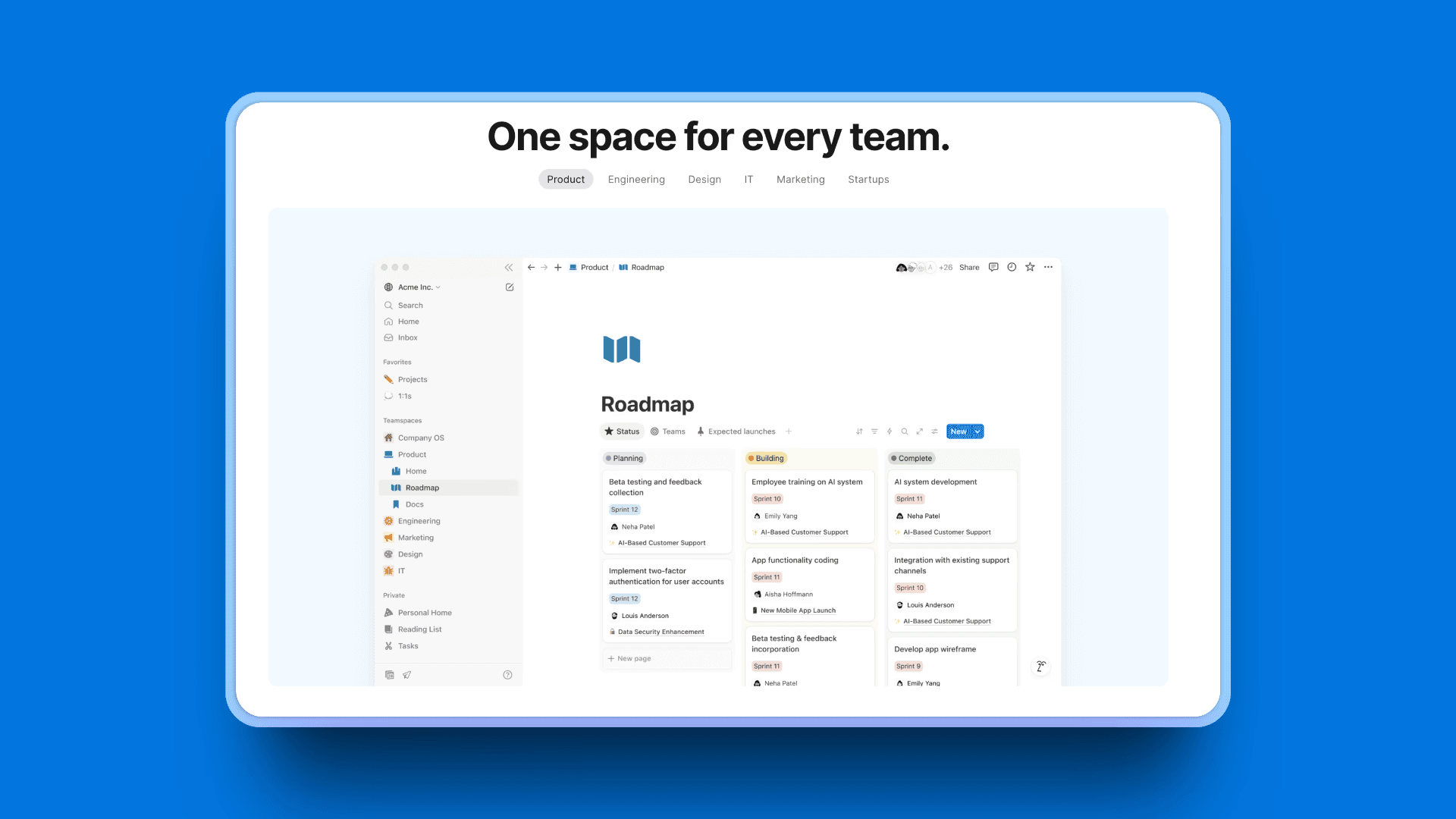
Notion is the all-in-one workspace and database platform that can become anything you want. Notion is incredibly flexible. You can build databases, wikis, project managers, or creative workspaces. The community has created templates for everything imaginable.
The downside? That flexibility comes with complexity. Expect to spend time learning how to set it up properly.
Pros:
Incredibly flexible, build exactly what you need: Block-based system lets you create anything from simple notes to complex project management systems. Customize databases, views, layouts, and workflows to match your exact process without template limitations.
Strong database features for organizing complex projects: Relational databases with multiple views (table, board, gallery, calendar, timeline). Link databases together, create formulas, filter and sort dynamically.
Perfect for interconnected information: Excellent for managing research sources, client projects, or content calendars where relationships between data matter.
Huge template community: Thousands of free community templates for every use case imaginable. Find pre-built systems for writing, project management, CRM, knowledge bases, and creative workflows. Clone and customize instantly.
Great for teams that want everything in one place: Replace multiple tools with one workspace. Combine wikis, docs, project tracking, meeting notes, and databases.
Centralized knowledge base: Reduces context switching and keeps all team knowledge centralized and searchable.
Affordable pricing: Plus plan at $12/user/month includes unlimited blocks and file uploads. Free plan suitable for individuals and small teams. More affordable than enterprise tools while offering comparable functionality.
Cons:
Steep learning curve: Database relations, formulas, linked databases, and advanced blocks require significant time to master. New users feel overwhelmed by options.
Weeks to reach proficiency: Expect 2-4 weeks before you're comfortable building complex systems with advanced features.
No visual brainstorming canvas: Pages are vertical documents, not spatial canvases. Can't freely arrange elements like a mood board or mind map.
Forces linear organization: Structure pushes you toward hierarchical thinking when visual, spatial organization would be more natural for creative work.
Can get messy and overwhelming: Freedom to create anything leads to organizational chaos without discipline. Pages proliferate, structures become inconsistent, and finding information gets harder as workspaces grow.
Performance lags with complex setups: Large databases (1000+ entries), heavily linked pages, and complex formulas cause noticeable slowdown. Page load times increase, database views take seconds to render, and editing feels sluggish.
Pricing:
$10/month per user, Business plan with AI $20/month per user
Perfect for:
Teams wanting one tool for everything, database-heavy workflows, highly organized teams
What real user says about Notion:
"What I like most about Notion is its versatility. I'm still amazed at how much you can do and create. I've tried so many different note taking apps and note taking systems. None have worked as well as Notion for helping me get everything into one place, organize it and make it efficient."
4. Trello - The Simple Task Manager
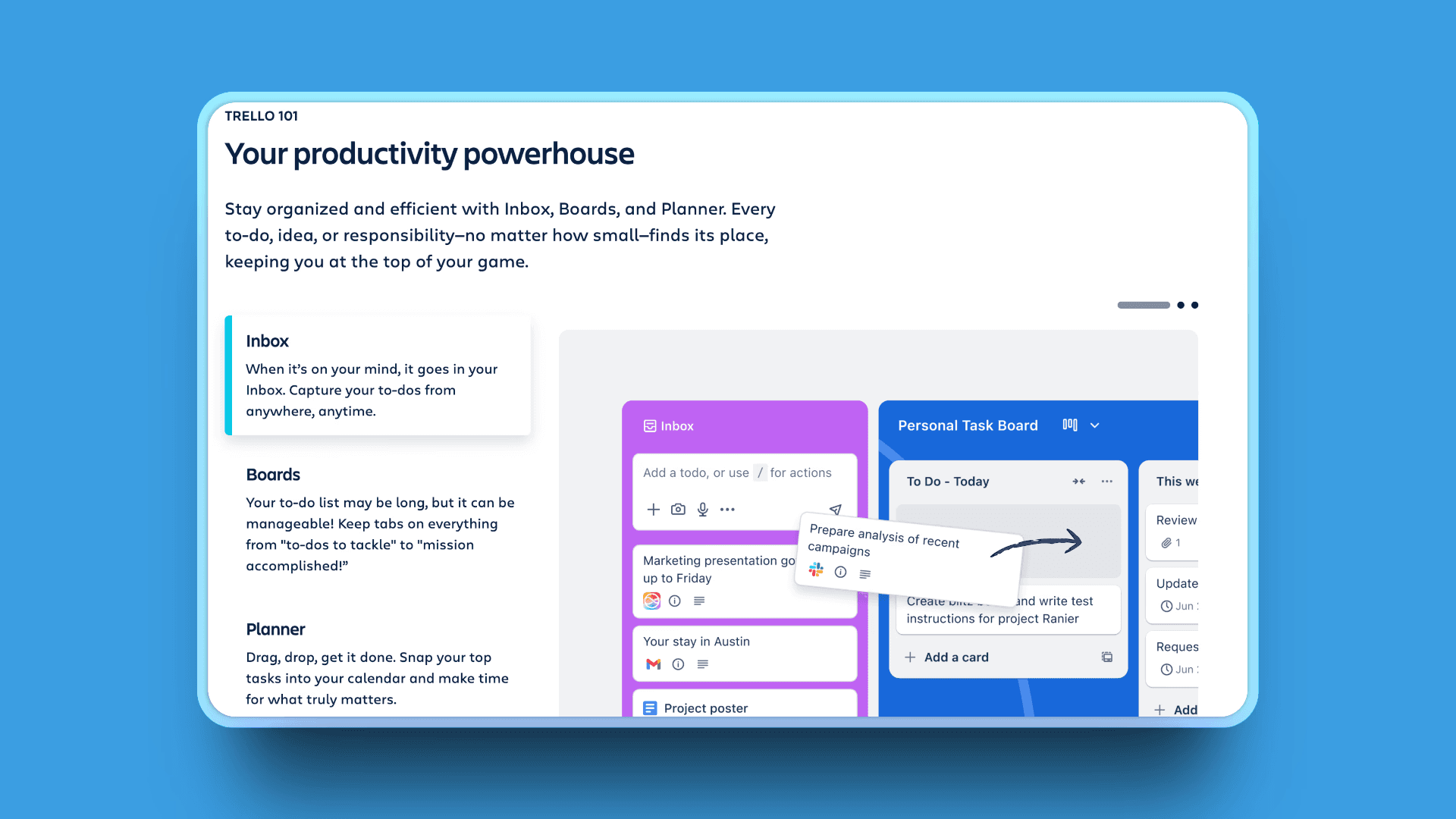
Trello makes Kanban boards easy with its simple cards, lists, and boards approach. Trello nailed simplicity. Anyone can figure it out in 5 minutes. It's perfect for straightforward project management and task tracking.
But if you're looking for creative brainstorming features, you'll be disappointed. It's more about organizing work than generating ideas.
Pros:
Dead simple to use: Pure Kanban board interface with cards, lists, and boards. Zero learning curve. Create a board, add cards, move them through workflow stages.
Instant productivity: Anyone can start using Trello productively within minutes without tutorials.
Great mobile apps: Native iOS and Android apps that actually work well. Full functionality on mobile including card creation, commenting, file attachments, and drag-and-drop.
Manage projects on the go: Work effectively from your phone during commutes or away from desk.
Affordable pricing: At $5/user/month, one of the most budget-friendly options. Free tier is genuinely useful with unlimited cards and 10 boards per workspace.
Perfect for task management: Excels at visualizing workflow stages (To Do, In Progress, Done). Checklists, due dates, labels, and member assignments keep tasks organized.
Drag-and-drop feels natural: Satisfying, smooth card movement across lists and boards. The tactile feel of moving tasks through stages provides clear visual progress.
Cons:
Limited creative features: Built for task management, not creative work. No mood board capabilities, visual organization, or spatial canvas.
Images lack visual organization: Can attach images but can't arrange them visually or use them for inspiration workflows.
Basic reporting: Limited analytics and progress tracking. No burndown charts, velocity tracking, or advanced metrics.
Can get messy with complex projects: Works great for simple workflows but breaks down with dependencies, sub-projects, or complex relationships. Lists proliferate, cards get cluttered with comments.
No visual brainstorming tools: Cards are text-based, not visual canvases. Can't create mind maps, mood boards, or spatial layouts.
Pricing:
$5/month per user
Perfect for:
Small teams, simple project tracking, task management
What real user says about Trello:
"My experience has been great. The Kanban style of the boards works really well for my work style. I use it to manage work projects and also for fun projects like shopping wishlists and vision boards."
5. Nuclino - The Fast Knowledge Base
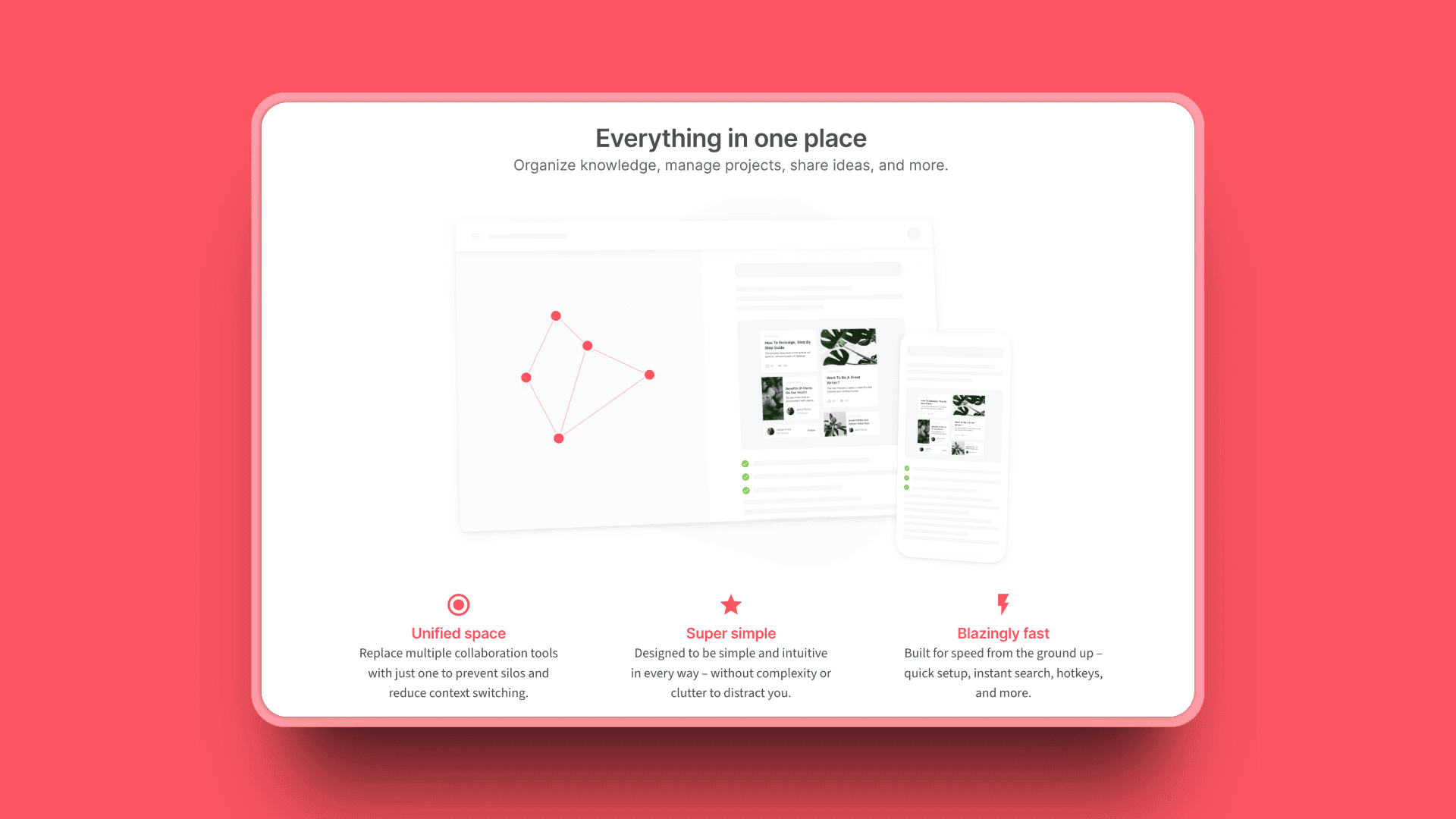
Nuclino is a lightning-fast knowledge base platform for collaborative writing and team documentation. Nuclino is all about speed. It loads instantly, search is crazy fast, and real-time collaboration actually works smoothly.
It's great for documentation and knowledge sharing, but lacks the visual creativity features most designers need.
Pros:
Incredibly fast performance: Sub-second page loads and instant search results even with thousands of pages. No lag when switching between items or editing content.
Optimized for speed: Built for performance over feature bloat, making it the fastest tool in this category.
Clean, distraction-free interface: Minimalist design that keeps focus on content. No cluttered sidebars, unnecessary buttons, or visual noise.
Excellent search functionality: Lightning-fast full-text search across all content with intelligent ranking. Finds relevant pages instantly without waiting.
Multiple organization views: Switch between list, board, table, and graph views of the same content. Graph view visualizes connections between pages, helping you see knowledge structure.
Easy real-time collaboration: Multiple users edit simultaneously without conflicts or lag. See teammates' cursors and changes instantly. Commenting and @mentions keep discussions contextual.
Cons:
Limited visual brainstorming features: Optimized for text-based knowledge management, not visual creativity. No mood boards, spatial canvas, or image-centric workflows.
Fewer integrations: Smaller app ecosystem compared to Notion or Miro. Basic integrations with Slack and Google Workspace exist, but missing connections to specialized tools.
Basic multimedia support: Can embed images and videos but lacks advanced features like native PDF viewing, video annotation, or rich media organization.
Smaller community: Fewer public templates, tutorials, and third-party resources. Getting help means relying on official docs rather than community forums.
Pricing:
Starter $6/month per user, Business $10/month per user
Perfect for:
Knowledge management, team documentation, fast collaboration
What real user says about Nuclino:
"I really enjoy how simple and easy to use Nuclino is! If you have a small to mid size team, this is a great solution to project management and even further than that, a knowledge base, asset base and more. Clean design, simple features, just great all around."
6. ClickUp - The Feature-Packed Beast
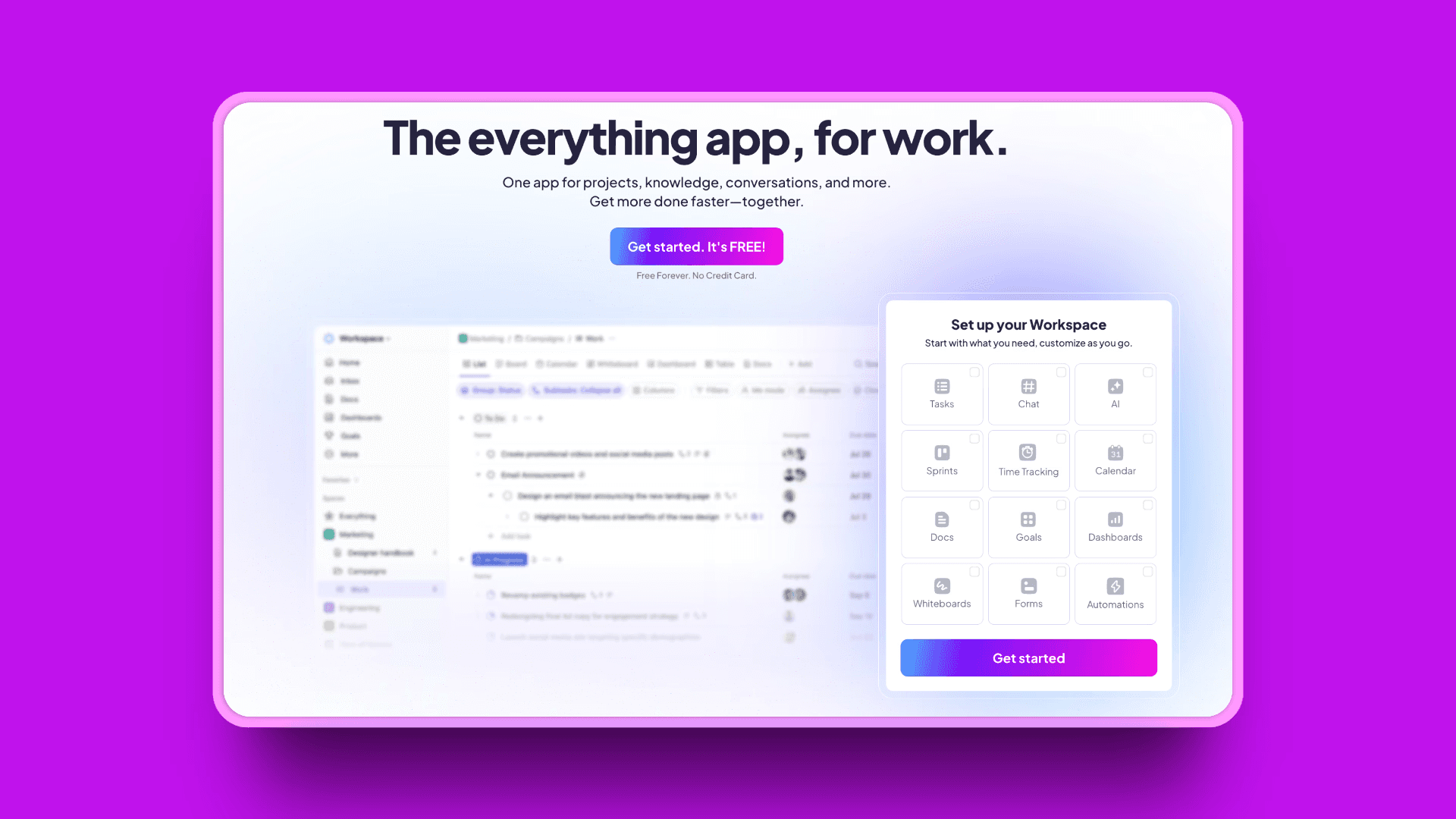
ClickUp is an all-in-one project management platform that tries to replace every productivity tool you use. ClickUp has every feature imaginable. Time tracking, goals, automation, whiteboards, docs, chat. It's all there.
The problem? It can feel overwhelming. Sometimes you just want to brainstorm, not configure a complex project management system.
Pros:
Tons of features for the price: At $7/user/month, includes time tracking, goals, automation, whiteboards, docs, chat, calendars, forms, and more. Exceptional value compared to buying separate tools.
Multiple project views: Switch between list, board, timeline (Gantt), calendar, workload, and table views of the same tasks. Each view optimized for different use cases.
Good automation tools: Build custom workflows with triggers and actions without coding. Automate status updates, assignments, due dates, and notifications.
Includes whiteboard functionality: Built-in visual collaboration boards for brainstorming and diagramming. Draw, add shapes, sticky notes, and connect ideas.
Comprehensive reporting: Detailed dashboards showing sprint progress, time tracking, workload distribution, and custom metrics. Generate insights about team performance, bottlenecks, and capacity planning.
Cons:
Overwhelming interface: Dozens of features compete for attention in crowded sidebars and menus. Finding specific functionality requires navigating multiple nested options.
Steep learning curve: Mastering ClickUp requires significant time investment. Custom fields, automation rules, permissions, and view configurations demand thorough understanding.
Can feel cluttered: Interface tries to surface everything at once, making screens visually busy. Too many buttons, icons, and options visible simultaneously.
Performance issues with complex projects: Large workspaces with thousands of tasks and heavy automation experience noticeable lag. Pages load slowly, views take time to render, and actions feel sluggish.
Pricing:
$7/month per user
Perfect for:
Teams wanting comprehensive project management, feature-heavy workflows
What real user says about Clickup:
ClickUp is an exceptional task management tool that has greatly enhanced my productivity. Its user-friendly interface, customizable features, and seamless collaboration capabilities make it an absolute game-changer...The integrated time tracking and reporting functionalities are invaluable for monitoring project progress and analyzing team performance. ClickUp's versatility and intuitive design truly simplify my work processes."
7. Scrintal - The Research-Focused Canvas
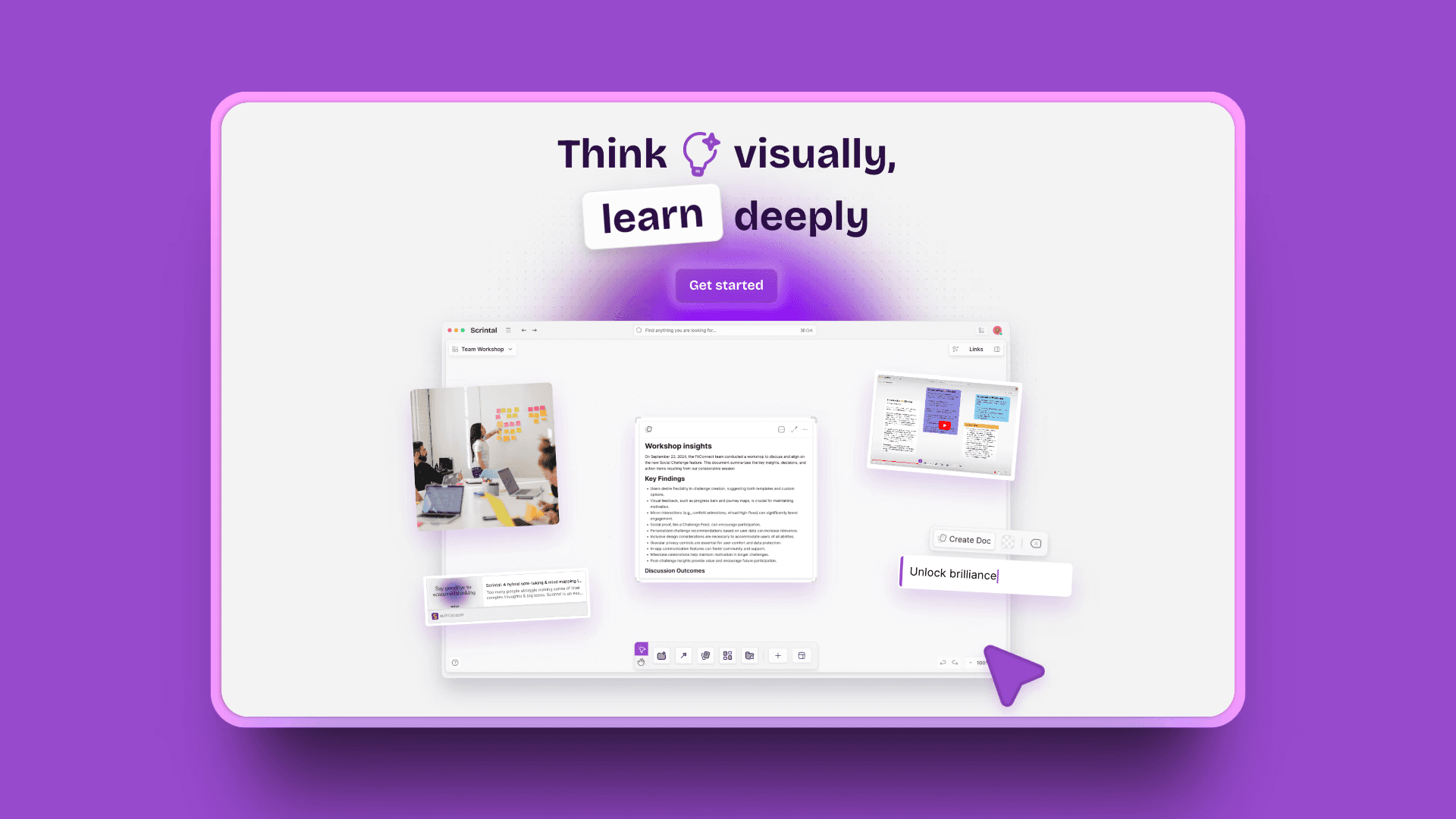
Scrintal is an infinite canvas tool designed specifically for researchers, students, and knowledge workers. Scrintal gets the academic crowd. It's built for connecting ideas, taking research notes, and building knowledge networks.
The linking system is powerful, but it's really designed for individual research rather than team collaboration.
Pros:
Unlimited canvas for spatial thinking: Infinite 2D space to arrange notes, cards, and ideas spatially. Organize research by physical proximity and visual relationships rather than rigid hierarchies.
Powerful note linking system: Bi-directional links connect related concepts automatically. See backlinks to understand how ideas relate across your knowledge base.
Focus mode for deep work: Distraction-free mode hides interface chrome and focuses on single notes or card clusters. Minimizes distractions during research sessions or writing.
Built by researchers for researchers: Designed around academic workflows like literature reviews, dissertation planning, and paper writing. Features like citation management reflect deep understanding of research needs.
Free tier available: Genuinely useful free plan with unlimited boards and notes. Sufficient for students and individual researchers.
Cons:
Limited collaboration features: Designed primarily for individual use. Real-time collaboration exists but feels basic compared to Miro or Notion.
Better for solo work: No advanced permissions, commenting threads, or team workflows. Better for solo researchers than collaborative teams.
Performance issues with large files: Canvas performance degrades with 500+ cards or heavy image usage. Zooming and panning become sluggish on large research boards.
Smaller user community: Niche tool with fewer users means limited templates, tutorials, and community resources. Getting help requires official documentation rather than extensive community forums.
Less polished interface: Functional but not as refined as established tools. Some UI elements feel rough around edges. Occasional bugs and quirks that mainstream tools have ironed out.
Pricing:
Free plan available, Personal Pro starts at $5/month
Perfect for:
Individual researchers, students, academic work, personal knowledge management
What real user says about Scrintal:
"I'm getting a much better result than using classic mind maps apps. Scrintal is much more flexible and versatile. I can move things up and down, zoom in and out effortlessly. Finally, I love how I can go into focus mode inside a node and start writing on a blank screen."
8. Evernote - The Classic Note Taker
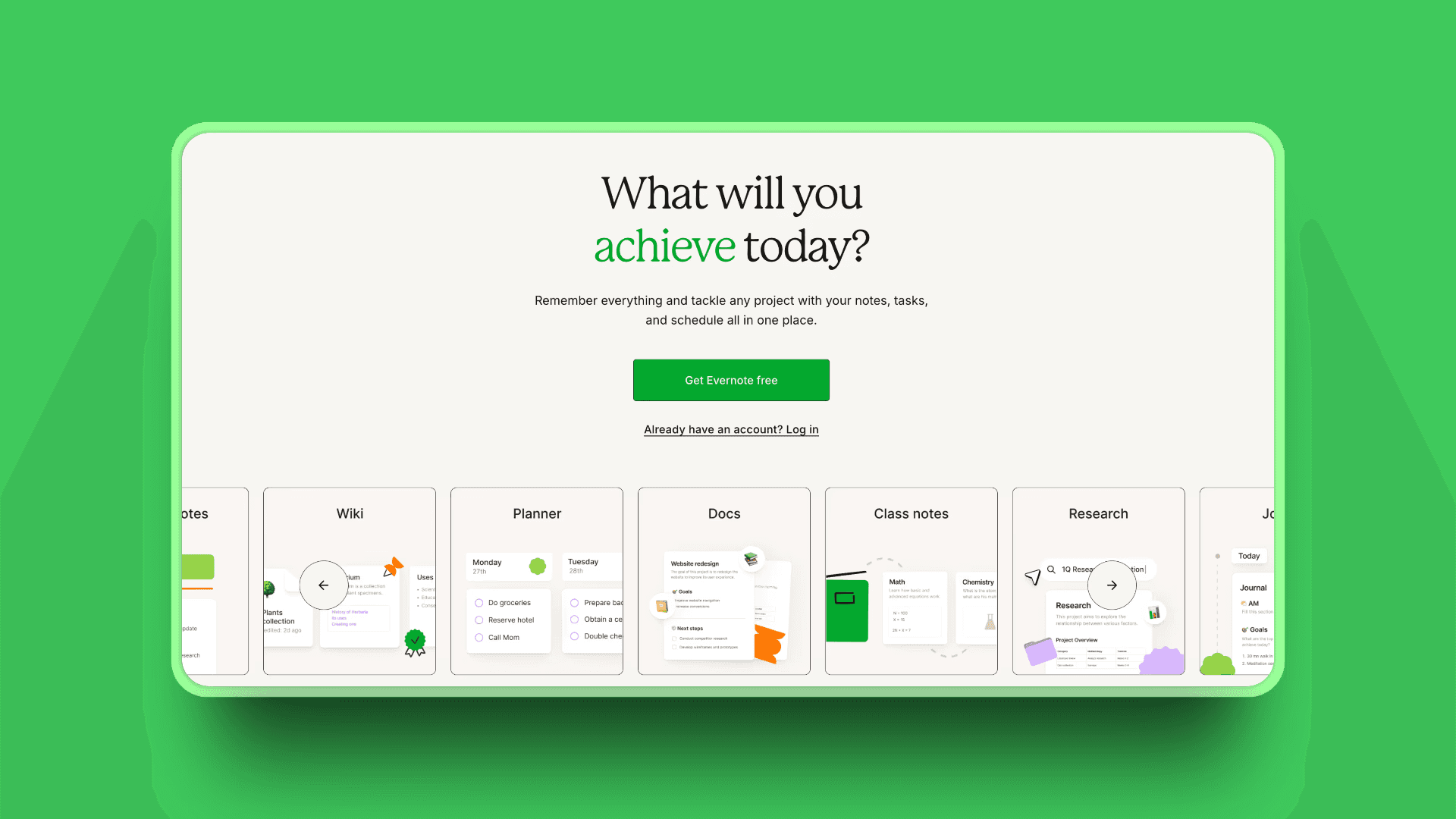
Evernote is the original digital notebook and note-taking app that's been around for over a decade. Evernote was great 10 years ago. The web clipper is still solid, and search works well. But it feels dated compared to modern alternatives. It's built for individual note-taking, not team collaboration or visual creativity.
Pros:
Excellent web clipper: Browser extension captures articles, receipts, PDFs, and screenshots with one click. Strips ads and formatting to save clean content.
Best-in-class clipping: Works reliably across all sites, including complex layouts.
Powerful search with OCR: Find text inside images, PDFs, and handwritten notes through optical character recognition. Search works across all content types instantly.
Works great offline: True offline-first design predates modern competitors. All notebooks and notes available without internet. Changes sync automatically when reconnected.
Cross-platform sync: Seamless synchronization across Mac, Windows, iOS, Android, and web. Notes created on phone appear instantly on desktop.
Mature, stable platform: Over 15 years of development means reliable performance and battle-tested features. Rare bugs, dependable sync, and consistent behavior.
Cons:
No visual organization features: Purely text-based hierarchical organization with notebooks and tags. Can't create mood boards, spatial layouts, or visual canvases.
No real-time collaboration: Sharing works but no simultaneous editing or live cursors. Comments and collaboration feel bolted-on rather than native.
Dated interface: Design feels stuck in 2015 with cluttered toolbars and dated visual styling. Interface hasn't evolved with modern UX standards.
Expensive for what you get: Advanced plan at $21/month (annual) feels overpriced for basic note-taking without modern features like AI, advanced collaboration, or visual tools.
Limited team features: No dedicated team collaboration plan available. Evernote focuses on individual use with basic sharing capabilities. Lacks advanced permissions, workflow automation, or sophisticated collaboration tools.
Pricing:
Free (limited), Starter $8/month (annual), Advanced $21/month (annual)
Perfect for:
Individual note-taking, document archiving, traditional workflows
What real user says about Evernote:
"Evernote helps me grab my random thoughts and voice recordings on the fly and they are synced between my phone and laptop. It puts my meeting snippets, web clippings, and to‑dos into notebooks that feel custom made to my work style."
Quick Comparison: What's Actually Different
Tool | Best For | AI Features | Built-in Browser | Price | Key Strength |
|---|---|---|---|---|---|
Kosmik | Research & Creativity | Visual Research | Yes | $11.99/mo | Built-in research without app switching |
Miro | Enterprise Teams | Basic | No | $10/user | Large team workshops and enterprise features |
Notion | All-in-One Teams | AI (Business plan) | No | $10-20/user | Flexible database-driven workflows |
Trello | Simple Tasks | Basic | No | $5/user | Simple Kanban-style task management |
Nuclino | Fast Docs | Basic | No | $6-10/user | Lightning-fast documentation and knowledge sharing |
ClickUp | Feature Lovers | AI writing, automation | No | $7/user | Feature-rich project management needs |
Scrintal | Research | Basic | No | Free+ | Visual note-taking and idea linking |
Evernote | Individual Notes | Smart search, OCR | No | $8-21/mo | Traditional note-taking and document organization |
Frequently Asked Questions
Is Milanote free?
Yes, Milanote offers a free plan with 100 notes, images, or links and 10 file uploads. The free plan is suitable for small personal projects but limited for larger creative work. The Pro plan ($9.99/month annual) removes these limits and adds unlimited uploads, version history, and team collaboration features.
Does Milanote use AI?
No, Milanote doesn't currently have AI features. The tool focuses on manual visual organization with drag-and-drop boards. If AI-powered features like auto-tagging, content discovery, or writing assistance are important for your workflow, you'll need to consider alternatives that include these capabilities.
How much does Milanote cost compared to alternatives?
Milanote Pro costs $9.99/month (annual). Comparable alternatives: Trello ($5/user), Nuclino ($6-10/user), ClickUp ($7/user), Miro ($10/user), Notion ($10-20/user), and Kosmik ($11.99/month yearly). Most alternatives offer better value with more features and collaboration tools at similar or lower prices.
Milanote vs Notion - which is better?
Milanote excels at visual brainstorming with drag-and-drop boards, while Notion is better for structured databases and team wikis. Notion offers AI features (Business plan), more integrations, and stronger collaboration. Choose Milanote for purely visual work; choose Notion for database-heavy workflows or teams needing one tool for everything.
Can I use Milanote alternatives offline?
Yes. Evernote offers true offline-first design, letting you work without internet and sync when reconnected. Notion caches content for offline viewing but requires internet for editing. For reliable offline work during travel or spotty connections, Evernote is your best option.
What's the best Milanote alternative overall?
Kosmik stands out as the best overall alternative with its built-in browser, AI-powered content discovery, and native multimedia support that eliminate app-switching during creative work. At $11.99/month yearly, it offers the most modern workflow for research-heavy projects. However, choose Miro if you need enterprise collaboration features, Notion for database-driven workflows, or Trello if you prefer simple Kanban boards at a lower price ($5/user).
Which Milanote alternative is best for research-heavy projects?
Kosmik excels for research workflows with its built-in browser, AI content discovery, and visual similarity search that eliminate app-switching. Notion works well for text-heavy research with powerful databases to organize sources and notes. Evernote offers strong web clipping for article collection. Choose Kosmik for multimedia research with visual content, Notion for structured text research, or Evernote for simple web article collection.
Can I import my Milanote boards?
No direct import exists for any of these alternatives. Milanote allows you to export your boards as images or PDFs, but you'll need to manually recreate your structure in your chosen alternative. Notion and Evernote can import images and PDFs, making the transition easier. For visual content, you can drag exported images into Kosmik, Miro, or other visual tools. Plan for manual migration time when switching.
Which Milanote alternative has the best AI features?
Different tools excel at different AI capabilities. Kosmik offers AI-powered visual similarity search, auto-tagging, and content discovery for research workflows. Notion provides AI writing assistance and content generation (available in Business plan at $15/user). ClickUp has AI Brain for task automation and summarization. Choose based on your needs: Kosmik for visual research AI, Notion for writing AI, ClickUp for workflow automation.
Which Milanote alternative works best for artists and designers?
Kosmik and Miro are top choices for visual work. Kosmik excels at mood board creation with AI-powered visual similarity search and built-in browsing—perfect for finding inspiration without app-switching. Miro offers extensive design templates and collaboration features ideal for client presentations. For research-heavy artists, Kosmik's AI asset finder and automatic content suggestions stand out.
What's the best Milanote alternative for writers and content creators?
Notion leads with powerful databases for organizing research, characters, plot lines, and publishing schedules. Kosmik excels for research-heavy writing—AI content discovery finds relevant articles automatically, and visual organization helps with plot mapping. Evernote works well for traditional note-taking and web clipping. Choose Notion for database-driven writing, Kosmik for research-heavy projects, Evernote for simple notes.
Which Milanote alternative offers the best video support?
Kosmik offers comprehensive native video support for viewing and organizing video content directly in your workspace. Notion allows video embeds from YouTube and Vimeo but not direct file playback. Miro supports video embeds for presentations. Most other alternatives (Trello, Scrintal, Nuclico) require external players or only support video links. For native video playback and organization, Kosmik is the strongest option.
The Bottom Line
The creative workspace world is splitting into two camps. There are the traditional tools that organize what you already have, and the new AI-powered tools that help you discover what you didn't know existed.
Kosmik represents where things are heading. Built-in research, AI assistance, and seamless multimedia support aren't just nice features. They're becoming essential for modern creative work.
Most of the other tools are playing catch-up to features that were innovative 5 years ago. Kosmik is building for where creative work is going, not where it's been.
Get started with Kosmik. If you do any kind of research-heavy creative work, the built-in browser and AI features alone will change how you work.

